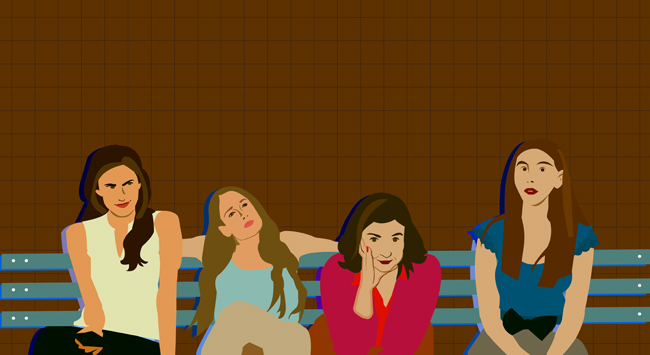There’s a moment in the third episode of “Girls,” the new comedy created, written and directed by “Tiny Furniture” auteur Lena Dunham, where the show transcends being really good to being great. It’s a sequence made in the image of pure cliche, a trope of postfeminist movie shorthand for empowerment: the goofy group bedroom sing-along dance scene.
These scenes, with their purposely overworked lip-synching to ‘80s pop, their hairbrush microphones and matching outfits, rarely ring true. They portend a call to arms, a coming together of women to share in a song and dance of solidarity, empathy and fun — their friendship and commitment to each other deepened with each harmony.
Except most of these sequences are just silly, lazy and fleeting. They are akin to pusillanimous narrative shortcuts, such as the shopping montage and crying in the rain.
But when Hannah (Dunham) and Marnie (Allison Williams, daughter of “NBC Nightly News” anchor Brian Williams), best friends navigating post-graduate stupors in New York, dance together in a bedroom to Robyn’s “Dancing On My Own,” it not only succeeds in bringing them closer, but it’s also completely earned and makes total sense.
Yes, “Girls” emerges as an unexpected corrective text to ‘00s-era cultural conventions, rendered in a sparse, honest ensemble comedy that’s finely acted and immensely watchable. It is generation Y’s intellectual devotional, created by a woman who grew up on Clinton and W. Bush-era pop culture who made a series for her peers.
The pilot opens on Hannah being unceremoniously given “one last push” from her parents: They’re severing financial ties from Hannah, an aspiring memoirist who can’t finish her book because she hasn’t “lived it yet” who is forced to figure out self-sustainability.
But this bildungsroman, refreshingly, doesn’t dwell on its topicality. Sure, Hannah is faced with New York City-sized rent and no job and an unused college degree, much like some of her peers of actual 20-somethings, but her and her friends’ struggles are never direct or surface level. It’s about the anxiety and fear of failure and that internal tension between wanting the protections of youth and reaping the benefits of finally growing up.
And Dunham’s show masterfully captures the kind of willful poor decision-making that comes from this tension. “Girls” depicts those young adult moments — of realizing that a choice you’ve made, convinced of your own maturity and agency, was actually awful and foolish — with a charming sense of bemusement.
Sometimes they’re just funny bursts of self-loathing (“I just bought four cupcakes and ate one of them in your bathroom”), but others are protracted and tumultuous, like Hannah’s relationship with her sort-of boyfriend Adam (the spectacularly abhorrent Adam Driver), whose belittlement of her at every turn doesn’t keep her away.
What holds the show together, though, is the easiness of the cast’s friendship. There’s a naturalness to their interactions: whether it’s the put-together and cutting Marnie butting heads with Jessa (Jemima Kirke) and her careless sense of adventure, or Hannah commiserating with Shoshanna (Zosia Mamet) “about the stuff that gets up around the sides of condoms,” you get the sense that not only are these young women real, but could also be real friends.
This is all by Dunham’s design, who comes across in “Girls” as even more a self-assured filmmaker. You can also see the careful, guiding hand of producer Judd Apatow, whose theatrical raunchiness is withheld for his ability to render small moments of powerful emotional resonance.
Dunham proved great at those instances too in “Tiny Furniture,” but here it’s more focused and affecting. Episode two weaves the idea of facing your own mortality into a plot about an STI exam.
But the reason you should watch “Girls,” even if you have an XY chromosome, is how sobering and honest it is about young people and the friends they have and the choices they make. Sometimes it feels so relatable as to be overwhelming, but it also knows that laughter, something this show is overflowing in, is what can get us all through it.
Published on Friday, April 13, 2012 as: Girls. Show depicts friends' lives, love, adulthood




















